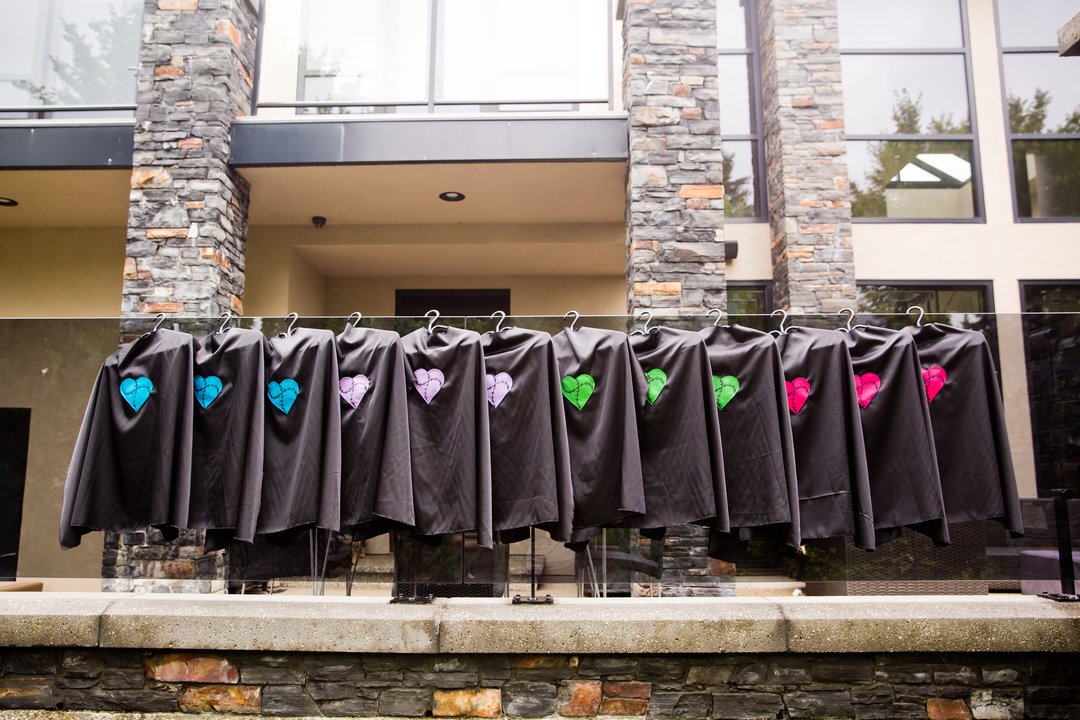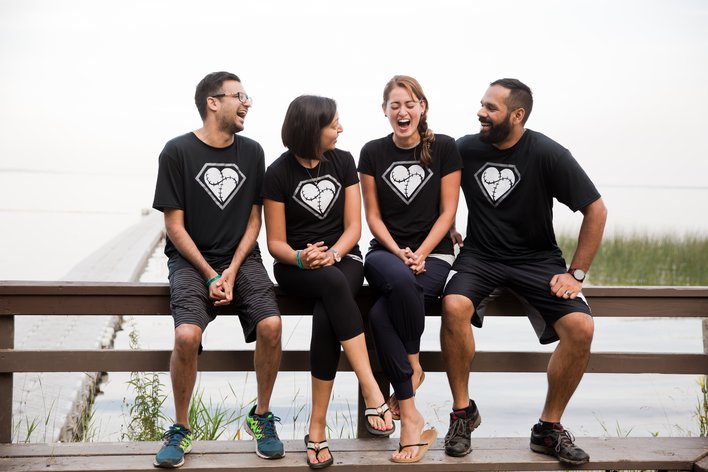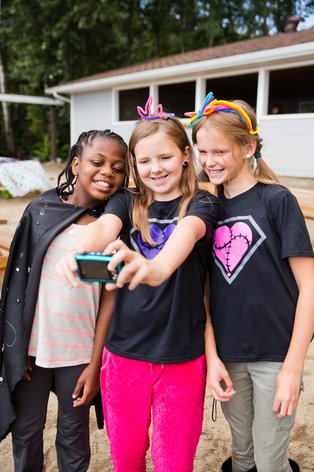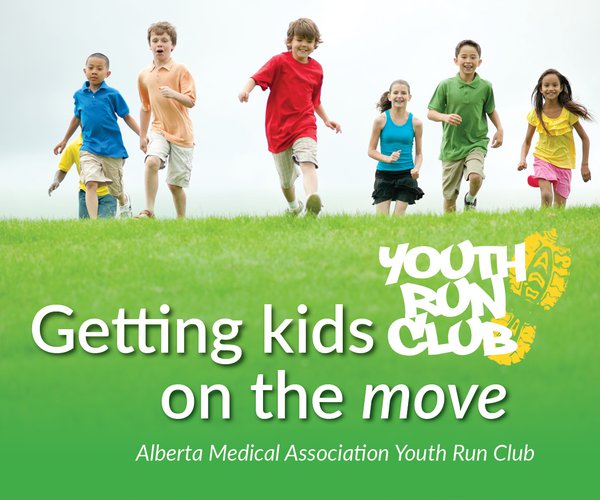You know you have a good thing going when you can’t wipe the grins off the children’s faces and you hear comments like, “For a five-star rating, I’d give this camp at least a 12!”
Heart Heroes Camp, held last August 4-7 at Camp Yowochas near Wabamun Lake, was just that awesome.
Originally called “Camp Oak (One-of-a-Kind)” and subsequently re-named Heart Heroes Camp, this Emerging Leaders in Health Promotion grant project (2016-17 stream) was developed by Dr. Devin Chetan, a third-year pediatric resident at the University of Alberta.
Seventeen children (ages eight to 14) with congenital heart disease gathered at Heart Heroes Camp to get dirty hands and scraped knees as they participated in typical summer camp shenanigans: arts and crafts, water fights, boating and zip-lining. But that’s where the “typical” ends. For the campers and their parents, Heart Heroes Camp was a first.
“It’s not an easy thing for us, as parents of a medically complex child, to pass over the health and safety of our children to complete strangers. In fact, I never do. Correction: I never have – ever – until now,” says mom Shannon Moroz.

Leap of faith
The leap of faith required of the parents of these children – afflicted with complex forms of congenital heart disease, from single-ventricle physiology to heart transplants, strokes and more – was immense.
“Children born with congenital heart disease are often excluded from many recreational programs because they require higher levels of medical care,” explains Dr. Chetan. “Most community programs don’t have the facilities or expertise to care for this patient population. This camp was created to promote independence among campers, encourage new friendships, build confidence and help the kids realize that they aren’t alone; other kids face similar obstacles and challenges.”
One camp family, the Posts, describes the gamut of emotions experienced by most campers and their families in the days leading up to the camp. After enthusiastically registering 12-year-old Austin for Heart Heroes Camp, the family “fell in love with the vision for it,” says Christine Post. However, as packing time drew near, Austin expressed some reluctance and his parents, Christine and Ian, “didn’t require any extra convincing to agree with him. Perhaps it was a better idea to wait another year or two, until Austin was older and more independent,” they thought.
But a caring call from a physician on the Heart Heroes Camp team, asking what she could do to ease the family’s worries about attending camp, prompted a happy change of heart in the Post household and packing eagerly resumed.
An awareness and understanding of that parental anxiety was a key factor in the detailed and thoughtful organization of the camp, all of which contributed to a reassuring sense of confidence felt by campers and their parents.
It was project mentor and Stollery Children’s Hospital pediatric cardiologist, Dr. Jennifer Conway, who emphasized the need to address parental anxiety.
“Jennifer was able to provide a unique perspective on how parents would feel, sending their children away to camp,” says Dr. Chetan. “She advised that we consider medical safety at each step of the planning process and that we seek the input of other specialists.”
That attentiveness to parents’ concerns was duly noted.
“When we arrived at camp to drop Austin off,” says Christine, “we were immediately impressed and reassured to see that we recognized many of the volunteers as trusted medical personnel from the Stollery.”
And while Shannon admits to “watching the Facebook page like a hawk,” she, too, was confident her daughter Maya was in good hands.

‘I can’t do that … Yes I can, and I will!’
While post-camp data collection is ongoing, camper and parent feedback highlights two primary benefits: off-the-charts boosts in confidence and the development of many new friendships.
“Heart Heroes Camp was wonderful for building Maya’s confidence,” says Shannon. “Her favorite activity was zip-lining; something she has never tried before, and she shared how she was scared and nervous but she faced her fears and loved it … Maya was so excited to have done things and tried activities she didn’t think she could do.”
The new friendships, like the gained confidence and independence, will carry on well past those warm, wonderful Heart Heroes Camp days in August. “Maya doesn’t feel like she is all alone anymore, which is so important,” Shannon notes. “We don’t know many heart families in our area and sometimes having that connection with another heart kid is important.” And the bonus: “I’m also benefitting from building relationships with some of the other parents and being able to talk about the unique challenges we face as heart parents.”
When considering the value of his ELiHP project, Dr. Chetan comments on the health promotion advocacy skills and the opportunity the project gave him and his colleagues to get to know patients outside the confines of the hospital setting.
“It gave us a chance to interact with patients in a completely different way,” he says. “This allows us to better understand and advocate for them and their families, both within the hospital but also in the community. It not only underscored the importance of such initiatives to these incredible children, but also gave many of us a completely different perspective in thinking about our patients.”
Heart heroes can “just be children”
Dr. Chetan and his project team know they achieved their Heart Heroes Camp goals when they hear comments like Shannon’s: “It was a true comfort to know that we are sending our child to a camp where they allowed our heart heroes to just be children … To experience summer camp and all it entails and to help them develop confidence, courage, independence, pride and pure happiness; to see many of the medical professionals in a setting outside the hospital and offices and to make friends with them. I know our next visit to heart clinic will have Maya on full alert, looking for all (your) lovely faces.”

About the Emerging Leaders in Health Promotion grant program
The Emerging Leaders in Health Promotion (ELiHP) grant program provides funding to help medical students and resident physicians conceive and implement health promotion projects in support of the development of their CanMEDS/FM core competencies, particularly health advocacy.
Jointly sponsored by the Alberta Medical Association and the Canadian Medical Association and its subsidiaries – MD Financial Management and Joule – ELiHP projects facilitate the growth of physician leadership and advocacy skills in a mentored environment while enhancing the wellbeing of the general Alberta population through education, advocacy or community service.
Banner photo credit: Manuela Stefan, Toronto-based photographer

